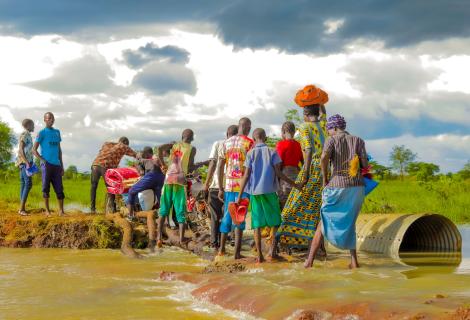The Interconnectedness of Peace, Security, and Climate Justice in East Africa

In the recent years, scientific forecasts have determined that climate change causes direct changes and damages that may then both directly and indirectly affect human beings in the long term. Particularly in Africa, the continent is faced with some of the most global pressing challenges including, poverty, climate change, peace and security. In Uganda and East Africa at large, the intricate relationship between peace and security and climate justice is much more prevalent.
Long gone are the days where climate justice was just looked at as an environmental crisis. It is now one of the most hard pressing threats to peace and security in East Africa, where resource scarcity and extreme weather conditions are causing and fueling tensions in addition to displacing people and communities. A case in point is the shrinking waters of Lake Chad where the flood ravaged lands of south sudan.
The very surpirising reduction of the lake’s size over the past decades in Lake Chad Basin has escalated competition over dwindling water and arable land. This in quite many ways has created fertile ground for extremist groups like Boko Haram, who exploit local grievenances and the desperation of the people due to the hard economics to recruit followers. Similarly, in South Sudan recurring floods have uprooted entire communities, deepening existing ethnic and political rivalries.
Direct conflict aside, climate change has greatly undermined human security across the East African region and by extension the African continent. Prolonged droughts and erratic rainfall have devastated crops and livestock, pushing millions towards famine. Meanwhile, shifting the cloudburst patterns and rising temperatures are depleting watersources hence sparking dispute between farmers and herders, as well as between neighboring nations sharing transboundary rivers.
Addressing these challenges requires more than just environmental policies—it demands climate justice. Vulnerable groups, including women, indigenous communities, and displaced populations, bear the brunt of climate impacts yet often have the least say in decision-making. Ensuring their voices are heard is critical to crafting equitable solutions. Equally important is investing in climate resilience, from drought-resistant farming techniques to sustainable water management, to help communities adapt and reduce the risk of future conflicts.
Some initiatives are already leading the way. The African Forest Landscape Restoration Initiative (AFR100) seeks to restore degraded lands across the continent, bolstering food security and biodiversity while mitigating climate pressures. Meanwhile, the Nile Basin Initiative fosters cooperation among 11 nations to manage the Nile’s resources sustainably, proving that shared environmental challenges can also be opportunities for collaboration rather than conflict.
As East Africa grapples with the dual crises of climate change and instability, the path forward must integrate peacebuilding with climate action. Only by addressing the root causes of resource scarcity and ensuring justice for the most affected can the region build a more secure and sustainable future
By
Muyinda Reagan
Development practitioner & International Relations enthusiast